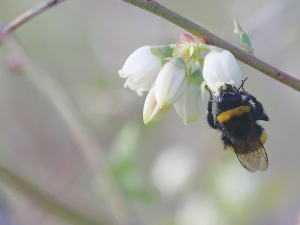NZ Catchment Groups Thrive with ‘Source to Sea’ Approach
The most successful catchment groups in NZ are those that have 'a source to sea' approach.
 MPI and the New Zealand Trees for Bees Research Trust have released a handbook which offers guidance on how to plant strategically to feed bees.
MPI and the New Zealand Trees for Bees Research Trust have released a handbook which offers guidance on how to plant strategically to feed bees.
The Ministry for Primary Industries (MPI) have released a handbook offering guidance on how to plant strategically to feed bees.
The document, which is being offered free to farmers, brings together knowledge from 10 years of field and laboratory research by the New Zealand Trees for Bees Research Trust, with significant financial support from MPI and other funders.
“It’s a useful tool to assist farmers support the bees, and incorporate into their on-farm planting for biodiversity and other environmental benefits that customers are now demanding,” says Dr Angus McPherson, Trees for Bees farm planting adviser and trustee, one of the lead researchers for the handbook.
“The beauty of our approach is that farmers don’t need to set aside land specially for this planting.
“We show farmers how to incorporate a low-maintenance bee forage planting plan into planting they’re already establishing to increase production and improve their farmland,” he says.
The handbook covers ten different types of plantations, including riparian protection, land stabilisation, native bush biodiversity, and edible plantations.
Each plantation type is described with examples, illustrations, advice, and plant lists.
“We aim to help build more resilient and sustainable farms by taking the best possible care of our star performer – the honeybee,” says McPherson.
“Bees all around the world are facing a number of threats, including pests, disease and pesticides. The best weapon against these threats is to provide our bees with a steady supply of forage to help them stay healthy and strong.”
He says this includes ensuring a wide range of flowering plants in spring and autumn when bees are most at risk of pollen and nectar shortages.
McPherson says the handbook’s principles and guidelines can be adapted to any type of farm, from pastoral to arable and horticultural farms.
“The same principles can also be applied when deciding what to plant in public parks, on lifestyle blocks and in home gardens.”
Steve Penno, MPI’s director of investment programmes, says MPI is proud to support the research.
“Honeybee health is crucial because bees are the foundation of agricultural production in the New Zealand economy.
“Planting essential bee forage as part of farm management will ensure a viable and sustainable future for our bees, beekeepers, and farmers.”
Since 2011, Trees for Bees has planted over 75,000 bee forage plants in 32 demonstration farms throughout New Zealand.
The Handbook for Planting Trees for Bees on Farms is available as a free PDF on the Trees for Bees website at treesforbeesnz.org/handbook. Limited softcover print copies are also available.
Pāmu has welcomed ten new apprentices into its 2026 intake, marking the second year of a scheme designed to equip the next generation of farmers with the skills, knowledge, and experience needed for a thriving career in agriculture.
One team with 43 head, including a contingent from Mid Canterbury, are reflecting on a stellar NZ DairyEvent.
Fonterra farmer shareholders have approved the mechanism for a $2/share capital return expected from the sale of its global consumer and associated businesses.
Trainees in the horticulture industry studying towards a certificate or diploma can now apply for Horticulture New Zealand's (HortNZ) 2026 Industry Training Scholarships programme.
OPINION: The first three Global Dairy Trade (GDT) auctions have been a morale booster for farmers.
Former Fonterra executive Alex Turnbull has been appointed CEO to lead all five Yili Oceania Business Division companies in New Zealand.

OPINION: Here w go: the election date is set for November 7 and the politicians are out of the gate…
OPINION: ECan data was released a few days ago showing Canterbury farmers have made “giant strides on environmental performance”.